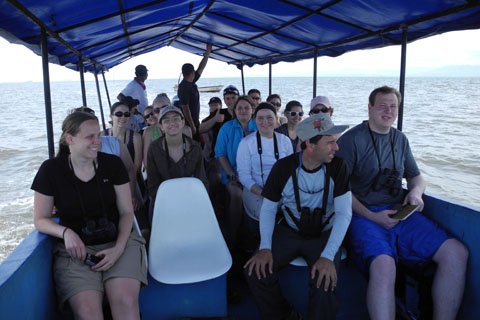Biology students study tropical ecosystems in Costa Rica
 |
| The students chronicled their experiences in Costa Rica through daily journal entries describing what they saw and came up with a list of 10 testable hypotheses about tropical ecology. |
"One of the benefits of the course is that it gives the students a taste of the challenges associated with doing field research in a remote setting,” said Dr. Tiegs. “Logistics, access to field sites, and sample processing all get more complex the further you get from your lab."
Being immersed in a teeming landscape of diverse wildlife gave participants a deeper perspective than traditional classroom learning.
“Tropical field ecology is a unique learning experience, because you aren't stuck in a classroom listening to lectures and reading out of a book,” said Jenae Curley, a senior biology major. “You are out in the field getting hands-on experience.”
To prepare for the trip, students were expected to compile chapter summaries from the textbook and be able to identify 75 species of flora and fauna. Once in Costa Rica, they each kept a log of the different species they observed and were required to write a short essay based on a 30-minute species observation.
“It was fun, because a bunch of us were competing on who could get the most bird species. I had 140.” Curley said.
Another student, senior biology major Elizabeth Undieme, said she also appreciated the hands-on aspects of the course.
“We learned all about how crocodiles are an integral part of the ecosystem, the reproductive behaviors of macaws, the migration patterns of whales and so much more,” she said. “Being able to see everything for yourself as you're learning about it, you definitely learn more than in a traditional classroom.”
The students also chronicled their experiences through daily journal entries describing what they saw and came up with a list of 10 testable hypotheses about tropical ecology. Curley said that these assignments encouraged the class to think like scientists and gave her a new appreciation for the unique educational opportunities available at Oakland.
“I learned so much in so little time, but at the same time I learned how little I actually know. It was a humbling experience,” she said. “You learn how many other species, besides humans, are so essential to our world, but on the flip side you start to realize how much power human beings have. We have the ability to become educated. Education gives us the power to respect, not fear, the wonders of the rain forest.”
Dr. Tiegs has organized trips to Costa Rica for the past four years for his Biology 474 class. He said the trips allow students to gain relevant scientific experience, as well as practical life experience.
“These trips provide students with an impressionistic understanding of the way these ecosystems function that is impossible to get from a more traditional classroom,” Dr. Tiegs said. “The experience also gives the students practical life skills, like how to pack for a trip in the tropics, navigate customs and stay healthy while abroad. For many of the students who have taken the course, I suspect that this trip will spark a lifetime-long interest in travel and ecology.”
To learn more about programs and opportunities in OU’s Department of Biological Sciences, view the website at oakland.edu/biology. Or learn more about study abroad or study away opportunities at oakland.edu/ie.
